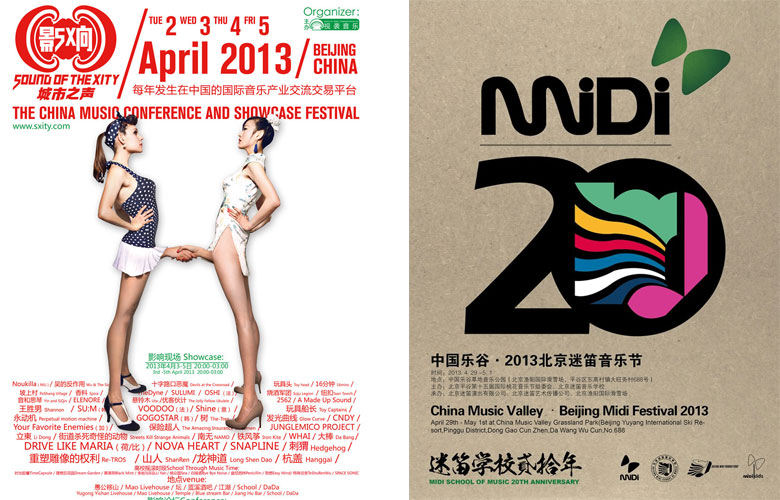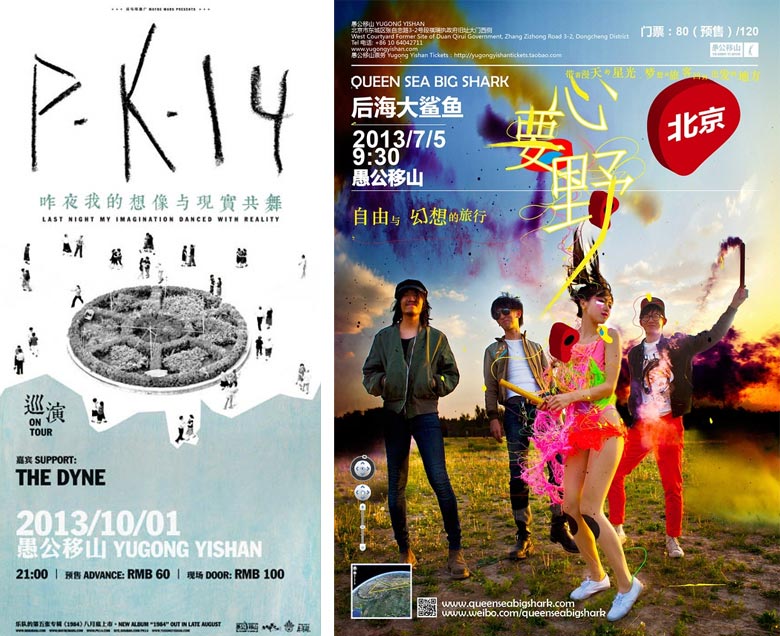On the national and international circuit, however, it seems that the government’s support of live music festivals is undeniable.
“The Chinese government has been committed to supporting and nurturing Chinese music festivals in recent years; with the Midi Music Festival growing in size and growing influence, rock music has also gradually received more and more attention from the government,” explains Maggie Wong (王曼), Media Operations Director of the Beijing Jazz Festival and the Midi Modern Music Festival. Midi, which happens annually, is the largest rock festival in China. “Midi Music Festival in Beijing was the first to obtain funds to support a cultural and creative rock music festival… Chinese rock music and music festivals are currently receiving great support from the government…”
Regardless, certain bands have been lucky enough to receive direct governmental support. Reggae band LongShengDao (龙神道), which translates to Dragon Road, is one of those bands; they have been on tours to Canada and New Zealand that were both sponsored by the Chinese Ministry of Culture.
然而,中国政府对现场音乐节却表现出了较大的支持,不管是在国内还是国外市场上。
“中国政府一直在致力于支援和培育中国音乐界,近年来,随着迷笛音乐节的规模和影响力越来越大,摇滚乐也逐渐受到政府越来越多的重视。迷笛音乐节是第一个获得北京市文创资金支持的摇滚音乐节…中国摇滚乐和音乐节正在受到政府的高度重视…” 王曼,北京爵士音乐节及迷笛音乐节的媒体运营总监说。迷笛是中国目前最大的,一年一度的摇滚音乐节。
无论如何,一部分足够幸运的乐队,以雷鬼乐出名的龙神道乐队,确实得到了政府的直接支持。他们已经在中国文化部的赞助下完成了在加拿大和新西兰的巡回演出。

Previously, the Chinese government largely supported traditional Chinese and Western music; they were relatively unfamiliar with modern music. But it is getting better, because they have discovered that modern music can be used to communicate with modern people, so they’ve begun to support musicians like us on international tours and exchanges,” LongShengDao explain.
Though the Chinese government may play a role in the lives of some musicians, it seems generally agreed-upon that the State-owned media – much like mainstream media everywhere – still prefers easily-digestible pop music over underground rock n’ roll.
“Mainstream Chinese media still holds deep prejudice and discrimination towards rock n’ roll music; TV, broadcasting, and publishing censorship is still very strict,” says Lu of AV Okubo. “By going through some [more] flexible measures, we can get legal version numbers to publish our record, spread it effectively over the internet, and even participate in some of the major open-air rock n’ roll festival activities – but with regards to the mainstream media and a sense of nationwide popularity, in contemporary China, [coverage] is still not realistic for a real rock band.”
“The local Chinese government remains highly suspicious of alternative Chinese music,” says Matthew Neiderhauser, photographer and writer behind SoundKapital, a 2009 book on underground Chinese bands and DIY spaces. “They would rather everyone watch the saccharine pop pumped out of televisions and radios around the country. Anything that borderlines on controversial will get nipped in the bud. There is also a lot of self-censorship due to the sometimes arbitrary nature of punishments handed out for dissent or cultural acts seen as political or social disturbances.”
From a wider point of view, China has the largest potential market and potential for consumer consumption. A large population and rapid economic development has resulted in a greater demand for music,” says ZiHan Qu (瞿子寒) of the folk-inspired rock band ShanRen (山人). “But to speak from a negative point of view, a strong media plays a decisive role is aesthetically misleading the public. Strong commercial motivations lead to a market which is dominated by vulgar and classless music.”
“中国政府以前大部分支持的是传统的中国和西方音乐,他们对于现代音乐比较陌生,但是越来越好因为他们发现现代的音乐可以与现代的人去沟通,所以他们开始支持像我们这样的音乐人去国外演出和交流,”龙神道乐队讲解。
尽管中国政府支持了一部分音乐家的现场演出活动,但整体上来说,由于中国媒体都是国家控制 – 主流媒体蔓延在各个地方 – 相对于地下摇滚乐来说,政府还是偏向容易为大众接受的流行音乐。
“中国主流媒体对于摇滚乐还是抱着很深的偏见和排斥,电视、广播和出版的审查制度仍然非常严格,通过一些灵活变通的手段我们可以拿到合法的版号去出版我们的唱片,在网络上进行行之有效的传播,甚至参加一些大型的露天摇滚音乐节的活动,但是谈到主流媒体和全国范围内意义上的流行,在当代中国,对于一支真正的摇滚乐队还是不现实的,”AV大久保的陆炎说。
“政府对主流音乐以外的音乐形式依然保持着高度怀疑和警惕,” Matthew Neiderhauser,SoundKapital (一本2009年出版,关于中国地下乐队的书)的摄影师及作者说。”他们希望每个人都只会欣赏观看那些从主流电视及电台传播的毫无营养却容易接受的流行乐。任何与主流不符的音乐形式都会被扼杀与摇篮之中。他们有时候还会利用自我审查,以担心对社会造成干扰为由,对那些与主流政治及社会价值相违背的艺术家进行迫害。”
“从大方面来讲,中国有最大的潜在音乐市场和消费潜力。众多的人口和社会经济的快速发展决定了人们对音乐需求的增长。但从另一方面来看,强势的主流媒体对大众审美的误导起到了决定性作用。巨大的商业需求导至过于娱乐化,低俗化的音乐占据了主要市场,”民谣摇滚乐队山人的瞿子寒说。

Listening Station #2: Dance Sounds
Downloads and streams from a selection of our favorite Chinese musicians.
Pet Conspiracy (宠物同谋)
Queen Sea Big Shark (后海大鲨鱼)
The Dyne – “浮游 (Seston)” – DOWNLOAD MP3
[audio:/wp-content/uploads/2013/10/The-Dyne_Seston.mp3|titles=The Dyne – Seston]Cat Machine (机械懒猫) – “我已湿透 (I’m Drenched)” – DOWNLOAD MP3
[audio:/wp-content/uploads/2013/10/Cat-Machine_Im-Drenched.mp3|titles=Cat Machine – I’m Drenched]“China’s education system is still more utilitarian; music or art is seen as an afterthought. Even professional art college is also based on practical knowledge rather than artistic education. This point is very sad. I personally have not studied music, is entirely their own interest or enthusiasm to do with this thing. In fact, as far as I know, of China’s new influential bands, there aren’t any who studied music professionally. – HuaDong from Re-TROS
中国的教育系统是很功利主义的,音乐或艺术在中国教育中只是一种补充。甚至在专业的艺术学校中,学生受到的教育也不是在艺术教育而是实践性知识基础上。这是很可悲的。我并没有真正学习过音乐,从事音乐完全出于我对音乐的兴趣和热爱。事实上,据我所知,那些新兴的有影响力的中国乐队成员中,没有一个是受过正规音乐教育的。 – 乐队重塑雕像的权利的华东
Education & Family // 教育及家庭
Where the Chinese government may only sometimes support musicians, Chinese households have long been fairly conservative in their approaches to a child’s educational future. Utilitarian educations that will lead to a good job or marketable skills are generally encouraged, and music and arts educations are often considered supplementary, rather than primary.
“Within the country, there is the growth of a unified education system, so that the majority of people still think relatively homogenously, [find it] easy to discriminate, [are] not willing to accept seeing something different, [with] hostility,” says YunGe Si of The Dyne.
“As anywhere, it is necessary to view traditional, socially accepted music and art from a different point of view than the independent underground currents,” explains Fortuny of Maybe Mars. “Music and art is encouraged in school and at home in the same way as most Western countries – that is, as long as it is correct and socially acceptable.”
In some extreme cases, studies in music and the arts are only considered only beneficial when they aid with college entrance exams – a vitally important and notoriously difficult life milestone for Chinese youth.
“Those who are especially skilled at arts or sports will score extra points on China’s college entrance exam, if you can play some instruments and have passed the examinations for the National Conservatory of Music…” explains Lu of AV Okubo. “In the eyes of parents, investing some money and energy into letting their children study music can be exchanged for considerable [college] entrance exam points; it’s a smart investment.”
如果说中国政府偶尔还会支持音乐家的成长,那么中国家庭对后代的教育普遍表现得很保守。以找到好工作,学会好技术为目标的功利主义教育被普遍接受采纳。相反的,音乐及艺术教育通常被视为一种教育补充。
“在国内,小孩在一元化教育体制下成长,使得绝大多数人长大后的思维比较固化,容易排斥,看到不一样的东西不予接受,敌对,” 迪恩乐队的司云阁说。
“如世界上任何一个地方一样,在中国,以不同的角度欣赏理解传统的、大众普遍接受的音乐及艺术是必须的。而人们对于独立地下音乐的态度则不同,”兵马司乐队的 Fortuny 说,”与西方国家一样,音乐及艺术在学校及家庭是得到鼓励的 – 前提是,这些音乐及艺术形式是所谓正确的并为社会所接受的。”
也有一些极端的例子,音乐及艺术教育被视为进入大学的特殊途径,而只有在这个时候学习音乐及技术才被看做有用的 – 对中国青少年来说,选择这种人生不仅意味重大,而且异常艰难。
“中国的高考有艺术或体育特长生的加分制度,如果你会一些乐器并通过了国家音乐学院的考级考试…在父母眼中,投入一些财力和精力让子女学习音乐而同时可以换取可观的高考的分数加分,是一笔聪明的投资,”AV大久保的陆炎说。







[…] China’s Indie Music Scene: Transforming Contemporary Chinese Culture From The Bottom Up –…: […]
Vivian, thank you for writing such a fantastic, in-depth article about the Chinese music scene! I am in fact one of the committed “portion of people” trying to bring Chinese music to a wider audience. I am the guy who makes The Sound Stage – thank you SO much for including two of my videos on page 1 of your article! I was thrilled to see that when Josh Feola shared this piece on his Facebook.
I also wanted to let your readers know that things are indeed changing, even at this time of writing I think a lot of what was quoted on Page 4 is already becoming irrelevant! Since August I’ve been doing a radio version of my “The Sound Stage” series (which is fully financed by China Radio International, a Chinese state media organ) every Saturday night primetime 6-7pm on FM stations in nearly every major city in China where I play Chinese independent rock, folk, hip-hop and more – I’ve played a track from just about every band mentioned here in this article. I upload each broadcast here thesoundstage.bandcamp.com
Vivian, 这篇文章非常棒,关于中国独立音乐的见解非常深刻。感谢你写这篇文章。我本人也致力于推广中国音乐,让更多的人了解中国音乐。我就是The Sound Stage(音你而乐)栏目主持人。真的特别感谢你在你的文章中提到我的两期节目。在Facebook 上看到Josh Feola的分享,我简直太激动了。
同时,我也希望你的读者能了解到现在正发生的一些变化。事实上,在我写下这些评论时,你在文章第四页引用的一些业界评论已经不符合当前的情况了。从今年8月份开始,The Sound Stage(音你而乐)广播版开播——完全由中国国际广播电台独立承办,每周六晚上6:05点到七点,通过调频广播向中国主要城市传播。这档广播栏目中,我们会播放中国独立摇滚乐,民谣,Hip-hop等。你文章中提到的那些乐队,我几乎都有播放过他们的音乐。打开这个链接,可以看到所有往期的节目。
Hey Jonathan! Thanks for writing, and I love the work you do. I’ll definitely check out your Bandcamp… who are some of your favorite Chinese musicians at the moment? If you ever would be interested in putting together a Chinese music mixtape for REDEFINE, consider this an invite. Cheers and really good work on Sound Stage. 🙂
Vivian, I would love to, thanks! I’ll get to work on that right away. I really Residence A (A公馆)and their CD release party at MAO Livehouse was possibly the best show I’ve seen at that venue. I’m also very impressed by the music coming out of Dalian – namely, Which Park and Doc Talk Shock. Since I’ve started my show I’ve been branching out beyond Beijing and there is really cool stuff coming out of any and every city – Xi’an, Chengdu, Guangzhou. Check out Golden Cage, The Fuzz and The Muff. I’ll always have a soft spot for New Pants(新裤子), though!
I actually also reached out to Josh about a mixtape idea! I wonder if you guys could collab on a series or if you could do one later on next year in 2014? (He’s slated in January.) No rush. Feel free to e-mail me at huav@redefinemag.com, too! 😀
I’m cool with either! I’ve emailed you =)
This is really great. I read this from China, after having filmed over 30 bands in the last 2 months, to be released as a moment in time style documentary as soon as humanly possible. I hope to make this excellent, and spread it as far and wide as I can. Thanks for doing this. It needed to be done.
Thank you kindly! Please keep me posted when you finish your piece. 🙂
Speaking of expat bands, do you think there is a place in China’s music scene for expat bands to be taken seriously? It often seems to me that an expat musician is seen more as a novelty than anything, and that there seems to be little excitement, coverage or promotion about what expats are doing musically exactly because they are not burgeoning, Chinese musicians.
Are you speaking in terms of the local Chinese audience or larger international audiences?
My only real experience is with local audiences, both Chinese & expats. I’m unsure what the int’l audience thinks. I’d agree with this article concerning them.
Many expat bands are respected and treated as “locals” as long as they are truly creating something new and not just playing “drunken Jimi Hendrix covers.” Take the band Pairs, for example. They are one of the biggest acts out of Shanghai, and the lead singer and guitarist is from Australia. I guess what people take an issue with regarding expat bands would be a concept that is something of an opposite to what Josh Feola described as “China Cred” – call it Expat Cred? “Hey, we’re foreigners in China playing rock music” just doesn’t cut it anymore. Having said all that though, this IS China, so I think it’s only natural that people would be more interested in what local Chinese people are doing. Hopefully as the scene here gains more ground and international prominence, it won’t matter who you are or where you are from, but just what you are bringing musically to the table.
thanks for using some tenzenmen links too (and i’ve added the article to alternativechina.tumblr.com). anyone looking to hear or buy more chinese music can check out tenzenmen.com.
also – D22 is no longer there (as is their url)!
thanks for the double heads up!
Order a whole lot of Chinese vinyl, CDs, cassettes and even some shirts and posters from http://www.faroutdistantsounds.com